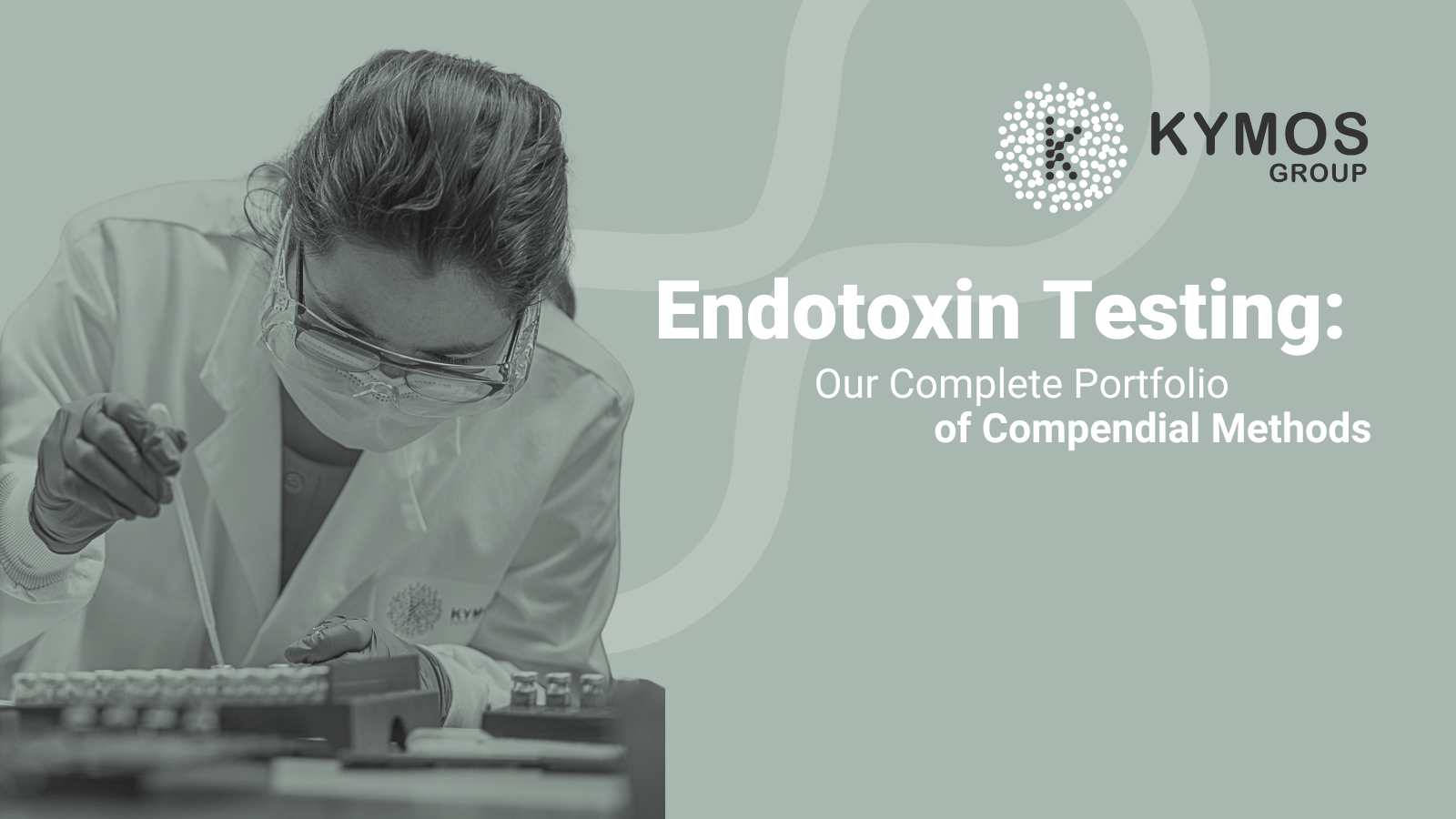At Kymos Group, we continuously expand our analytical capabilities to support and match the needs of the pharmaceutical and biotech industries with state-of-the-art quality control solutions. Endotoxin testing is crucial when dealing with the safety of injectables, biologics, and medical devices, and we have updated our catalog of services to offer the full range of compendial endotoxin detection methods as described in the European and US Pharmacopeias.
To provide our clients with maximum flexibility, we’ve recently added the Kinetic turbidimetric and Recombinant Cascade Reagent (rCR) methods and now our portfolio is fully comprehensive. These additions enable us to tailor the best approach for each specific project and adapt to clients’ and regulatory requirements.
What Are Endotoxins, and Why Are They a Concern?
Endotoxins are lipopolysaccharides (LPS) found in the outer membrane of Gram-negative bacteria. The presence of these substances in pharmaceutical products presents an important risk because they can trigger severe immune responses in humans. These responses may manifest as fever and inflammation, or progress to severe, life-threatening conditions such as septic shock.
Endotoxins are also heat-stable and resistant to many conventional sterilization processes, and for this reason, regulatory agencies worldwide impose strict endotoxin limits on injectables, biologics, and medical devices.
All these factors are the reason why robust and sensitive testing methods are essential to prevent contamination and ensure patient safety.
Which are the Methods for Endotoxin Testing?
The methods employed for endotoxin testing are primarily based on bacterial endotoxin tests (BET), as described in pharmacopeias such as the United States Pharmacopeia (USP) and the European Pharmacopoeia (Ph. Eur.):
- Gel-Clot Method – The traditional and most simple Limulus Amebocyte Lysate (LAL) test. It’s a qualitative or semi-quantitative assay that is based on the endotoxins activating a clotting enzyme in the LAL reagent and provides a positive result if there is visible gel clot formation. It is normally used for initial screenings or routine batch release as its results are only qualitative or rough concentration estimates.
- Kinetic Chromogenic LAL: A quantitative method that measures the color produced by the reaction between LAL and endotoxins enabling the determination of their concentration with high sensitivity and accuracy. These assays are widely used for determining compliance with specific endotoxin detection limits.
- Kinetic Turbidimetric LAL: A quantitative method that instead of measuring color measures the increase in turbidity as the LAL reaction progresses. This assay provides a rapid and high-throughput way of precisely quantifying endotoxins, making it the ideal candidate for large-scale testing.
- Recombinant Cascade Reagent (rCR): An alternative quantitative method to traditional LAL tests that depend on the LAL reagent, which is derived from the blood of horseshoe crabs. This animal-free assay includes the three recombinant proteins (recombinant FactorC, recombinant FactorB, and recombinant proclotting enzyme), the 3 components of the LAL enzymatic cascade that provides a more sustainable alternative while maintaining accuracy and compliance.
With the recent addition of the kinetic turbidimetric and rCR methods, we can now perform all four endotoxin testing methodologies, ensuring flexibility for our clients, while meeting regulatory requirements and standards.
Choosing the Right Endotoxin Testing Method
Each endotoxin testing method has its own advantages, and the best choice depends on various factors. Thanks to our experience and specialized team, we guide our clients in selecting the most suitable method for their needs, balancing regulatory compliance, efficiency, and scientific rigor.
The factors that we base our decisions on are:
- Regulatory requirements: Pharmacopeias such as USP and Ph. Eur. recognize all four methods, but specific regulations may favor one over another for certain applications.
- Sensitivity and accuracy requirements: The required level of detection and quantification accuracy is always considered when deciding on the method to use.
- Product characteristics: The nature of the product being tested (its composition, viscosity, color, etc.) can influence the suitability of a particular method over another.
- Project timelines: For projects with demanding timelines, high-throughput methods, such as kinetic turbidimetric LAL or kinetic chromogenic, offer advantages due to their rapid turnaround times.
- Ethical considerations – The recombinant Factor C method is an animal-free alternative, which favors sustainable and ethical practices within the industry.
Our experience with Endotoxin Testing
As part of our ongoing commitment to growth and expanding our service portfolio, we have recently implemented the kinetic turbidimetric LAL method and the Recombinant Cascade Reagent (rCR) method, allowing us to offer all pharmacopoeia-recommended endotoxin testing methods.
For the kinetic turbidimetric LAL assay, we use second-generation technology that delivers rapid and accurate quantitative results, fitting our client’s turnaround times, and for the rCR method, we employ the latest advancements in recombinant technologies enabling us to deliver superior accuracy, robustness, and comparability, while offering our clients an animal-free alternative to traditional compendial bacterial endotoxin tests for those committed to the 3R principle in animal testing.
At Kymos Group, we are committed to providing comprehensive and flexible endotoxin testing solutions that meet the highest standards of quality and regulatory compliance. Our extensive experience and the recent addition of advanced testing methods ensure that we can tailor our approach to suit the specific needs of each project. By choosing Kymos Group, you are partnering with a team dedicated to ensuring the safety and efficacy of pharmaceutical and biotech products through robust and sensitive endotoxin testing.
If you need more information about these methods or any assistance with your endotoxin testing projects, please contact commercial@kymos.com. We will be pleased to provide you with detailed consultation and support.


